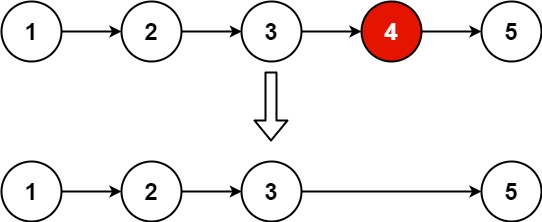[LeetCode April Challange] Day 18 - Remove Nth Node From End of List
Given the head of a linked list, remove the n-th node from the end of the list and return its head.
Follow up: Could you do this in one pass?
Example 1:

Input: head = [1,2,3,4,5], n = 2
Output: [1,2,3,5]
Example 2:
Input: head = [1], n = 1
Output: []
Example 3:
Input: head = [1,2], n = 1
Output: [1]
Constraints:
- The number of nodes in the list is sz.
- 1 <= sz <= 30
- 0 <= Node.val <= 100
- 1 <= n <= sz
Solution
Time complexity : O(n)
Space complexity : O(1)
/**
* Definition for singly-linked list.
* struct ListNode {
* int val;
* ListNode *next;
* ListNode() : val(0), next(nullptr) {}
* ListNode(int x) : val(x), next(nullptr) {}
* ListNode(int x, ListNode *next) : val(x), next(next) {}
* };
*/
class Solution {
public:
ListNode* removeNthFromEnd(ListNode* head, int n) {
if (head == nullptr) return head;
ListNode *dummy_head = new ListNode(0, head);
ListNode *first = dummy_head;
while (0 <= n--) first = first->next;
ListNode *second = dummy_head;
while (first) {
first = first->next;
second = second->next;
}
second->next = second->next->next;
return dummy_head->next;
}
};
概念是先用 first 跑 n+1 個,再與 second 同步跑。最後當 first 到達結尾時,second 的下一個即是第 n 個。
如此一來 將 second->next = second->next->next,即可跳過第 n 個。